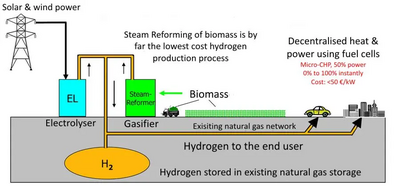The Hydrogen Economy by Karl-Heinz Tetzlaff
http://www.green-gas.net/k-h/index.html is a translation of Karl‐Heinz Tetzlaff's 2014 website

In a hydrogen economy energy is utilised and traded at all levels only as hydrogen. In practice this means:
- Conversion of all forms of energy into hydrogen
- Distribution of Hydrogen to the end user via the gas grid
- Decentralised conversion of hydrogen into electric power, heat and transport at the end user
The hydrogen economy is more efficient, less costly and produces lower CO2 emissions even when the primary energy is from fossil fuels. For a sustainable future however, the following criteria must be met:
- Sustainable
- Climate (CO2) Neutral
- Sufficiently available from indigenous sources
- Affordable ‐ at lower than current prices
In the hydrogen economy the primary source of energy is not really important. With unbiased calculation, renewable electricity and biomass energy can already be shown to be less expensive than from fossil fuels. The cost of distribution of energy via the gas grid is a small fraction of the cost of distribution via the power grid, and energy losses are also lower. Therefore sustainability, climate and environmental protection can all be achieved while reducing the cost of energy.

Karl‐Heinz Tetzlaff (1938 ‐ 2014) published this web site in German. His final editing was in August 2014.
Karl‐Heinz spent his career working as a chemical engineer at Hoechst AG where he was responsible for the development of Fuel Cells and Electrolysers. He also had long experience of chemical processes and was responsible for the estimation of costs to bring innovative processes to production.
Website is at: http://www.green-gas.net/k-h/index.html